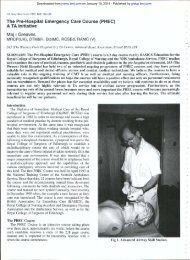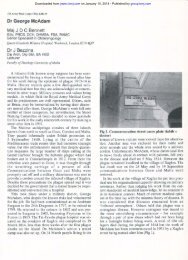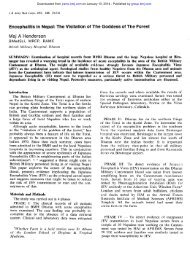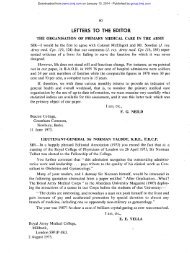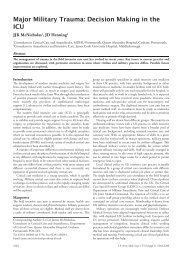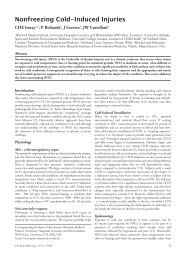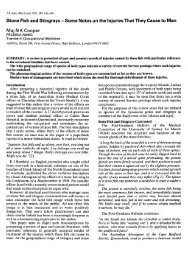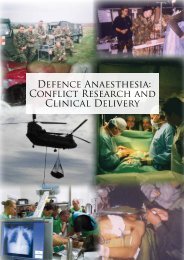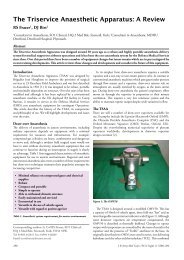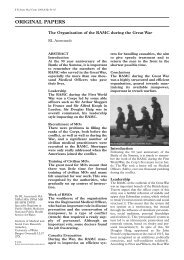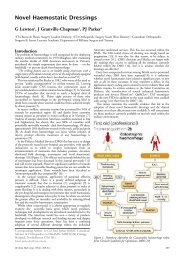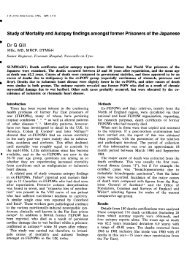LETTERS TO THE EDITOR - Journal of the Royal Army Medical Corps
LETTERS TO THE EDITOR - Journal of the Royal Army Medical Corps
LETTERS TO THE EDITOR - Journal of the Royal Army Medical Corps
Create successful ePaper yourself
Turn your PDF publications into a flip-book with our unique Google optimized e-Paper software.
Downloaded from jramc.bmj.com on January 10, 2014 - Published by group.bmj.com<br />
234 Book Reviews<br />
remedies, cope with <strong>the</strong> vast majority <strong>of</strong> common irifectious illness. Ante-natal and child-development<br />
clinics reduce fur<strong>the</strong>r needless morbidity and mortality.<br />
Only <strong>the</strong> few cases who do not fit <strong>the</strong> pattern are referred to doctors trained to a level which we<br />
would acknowledge. The impact <strong>of</strong> <strong>the</strong> implementation <strong>of</strong> <strong>the</strong>se lessons has been great. Morbidity and<br />
mortality statistics have been altered radically, and in some cases now resemble those <strong>of</strong> <strong>the</strong> developed<br />
countries, on a fraction <strong>of</strong> <strong>the</strong> budget. The removal <strong>of</strong> such barriers to health and vitality, as parasites<br />
and smallpox, have <strong>of</strong> course brought <strong>the</strong> emerging picture <strong>of</strong> degenerative diseases as we know <strong>the</strong>m.<br />
To progress fur<strong>the</strong>r, <strong>the</strong> need for massive investment in new medical manpower, diagnostic and<br />
<strong>the</strong>rapeutic tools is accepted, but <strong>the</strong> resources are not <strong>the</strong>re to meet this need, and <strong>the</strong> rewards will not<br />
be so great.<br />
This book carried vital messages for <strong>the</strong> improvement <strong>of</strong> health care in developing countries, but is<br />
perhaps aimed specifically at workers in that field.<br />
A. M. GRIEVE<br />
Moral Dilemmas in Medicine. Second ed. A. V. CAMPBELL. Edinburgh. Churchill Livingstone. 1975.<br />
Pp. x + 209. £1.95.<br />
This apt little book gives a very good description <strong>of</strong> <strong>the</strong> fundamentals <strong>of</strong> medical ethics and moral<br />
problems facing <strong>the</strong> doctor and <strong>the</strong> nurse today. <strong>Medical</strong> ethics in <strong>the</strong> army are little different than in<br />
dvillife and <strong>the</strong> advice in this book will be <strong>of</strong> <strong>the</strong> utmost value to anyone who reads it. J. MCGHIE<br />
Underwater Medicine. Fourth ed. S. MILES and D. E. MACKAY. London. Adlard Coles Ltd. 1976. Pp.<br />
xii + 330. £10.00. Illustrated.<br />
Each <strong>of</strong> <strong>the</strong> three Services has its own peculiar medical problems and each has developed its own<br />
expertise to counter <strong>the</strong>m. It should be no surprise, <strong>the</strong>refore, that this book, which is probably <strong>the</strong><br />
standard work on underwater medicine, should be <strong>the</strong> product <strong>of</strong> <strong>the</strong> Naval <strong>Medical</strong> Services. For this<br />
fourth edition <strong>the</strong> original author, Surgeon Rear Admiral Stanley Miles, who launched <strong>the</strong> book in 1962,<br />
has been joined by Surgeon Captain D. E. Mackay. They write on a subject which, nowadays, is <strong>of</strong> increasing<br />
interest not only to navies, but to large oil companies, to those who swim and dive as a hobby,<br />
and to a growing band <strong>of</strong> underwater scientists.<br />
This is a small book with forty-eight illustrations, not all <strong>of</strong> very good quality. The text, however,<br />
is lucid and economical, dealing with <strong>the</strong> physical, physiological and pathological aspects <strong>of</strong> underwater<br />
activity. For <strong>the</strong> <strong>Army</strong> <strong>Medical</strong> Officer who is not directly involved in <strong>the</strong> subject, it may be a disappointment<br />
that <strong>the</strong> book confines itself to 'underwater' as opposed to ' marine' medicine. I felt deprived,<br />
for example, <strong>of</strong> a section on exposure and survival whilst on, as opposed to under, <strong>the</strong> sea. The sections<br />
on respiratory function, <strong>the</strong> special senses and drowning, however, will be found especially informative<br />
for <strong>the</strong> non-specialist doctor.<br />
The scope <strong>of</strong> <strong>the</strong> book is wide enough to take in such varied subjects as marine animals (a ra<strong>the</strong>r<br />
superficial account), <strong>the</strong> training <strong>of</strong> divers, and snbmarines and submarine escape. There are also<br />
descriptions <strong>of</strong> various types <strong>of</strong> underwater hardware. Particularly interesting was <strong>the</strong> author's pleas for<br />
acceptance <strong>of</strong> a concept <strong>of</strong> " water safety" in <strong>the</strong> same way as we now think <strong>of</strong> " road safety".<br />
There is at <strong>the</strong> end <strong>of</strong> <strong>the</strong> book a selective list <strong>of</strong> references and suggestions for fur<strong>the</strong>r reading. It<br />
appears that, if <strong>the</strong> list is honest, no o<strong>the</strong>r single book exists dealing with this particular subject.<br />
D. M. ROBERTS<br />
<strong>LETTERS</strong> <strong>TO</strong> <strong>THE</strong> EDI<strong>TO</strong>R<br />
MITCIDNER MEMORIAL LECTURE-1975<br />
SIR-It was with considerable interest, and nostalgia, that I read <strong>the</strong> Mitchiner<br />
Memorial Lecture (1975)1, having served in Egypt (twice), The Sudan, Eritrea, Syria,<br />
Palestine, Belgium, Germany (twice), Japan (British Commonwealth Force, Korea),<br />
Malaya and in <strong>the</strong> Borneo operations (Sabah, Brunei and Sarawak) in <strong>the</strong> confrontation<br />
with Indonesia; as well as <strong>of</strong> course in England and Scotland.
Downloaded from jramc.bmj.com on January 10, 2014 - Published by group.bmj.com<br />
Letters to <strong>the</strong> Editor 235<br />
It might be apt for this lecture to be read in conjunction with " Pitfalls <strong>of</strong> Tropical<br />
Surgery"2 and "Imported Infections "3.<br />
All members <strong>of</strong> <strong>the</strong> medical pr<strong>of</strong>ession, at least physicians and surgeons should<br />
be trained in global, or transcontinental medicine. I found amoebiasis to be <strong>the</strong> most<br />
fascinating disease <strong>of</strong> all. Allow me to describe one case.<br />
He was a lecturer in <strong>the</strong> Staff College, Haifa, Palestine (1942-43) who complained<br />
<strong>of</strong> headache before his evening lecture which he delivered at 1700 hours, "fibrositis<br />
<strong>of</strong> <strong>the</strong> right shoulder, vague abdominal symptoms, general lassitude but no looseness<br />
<strong>of</strong> <strong>the</strong> stools. Briefly on examination his liver was palpable, and tender, two finger<br />
breadths below <strong>the</strong> right costal region. On screening <strong>the</strong> diaphragm was elevated,<br />
restricted in movement on respiration and exhibited paradoxical movement on sniffing:<br />
whilst <strong>the</strong> stools were loaded with vegetative forms <strong>of</strong> Entamoeba hystolytica.<br />
Standard treatment in those days (1942-43) was a course <strong>of</strong> emetine HCL, emetine<br />
bismuth iodide followed by carbarsone or stovarsol, and he made a complete recovery.<br />
Several years ago Sir James Baird surprised me by telling me that causes <strong>of</strong> trypanosomiasis<br />
had been admitted to a mental hospital in <strong>the</strong> United Kingdom before<br />
<strong>the</strong> true diagnosis was established: whilst a few years ago I was amazed to find ex-Far<br />
East prisoners <strong>of</strong> war suffering from unrecognised strongylodiasis and being treated as<br />
a disease <strong>of</strong> <strong>the</strong> skin.<br />
I am, etc.,<br />
76 Ravelston Dykes,<br />
Edinburgh EHl2 6HF.<br />
22 April 1976.<br />
JOHN MACKAY-DICK<br />
EDMUND ALEXANDER PARKES<br />
SIR-The first centenary <strong>of</strong> <strong>the</strong> death <strong>of</strong> Dr. E. A. Parkes has been duly commemorated<br />
by <strong>the</strong> College at Millbank and you yourself have made honorable mention <strong>of</strong> his many<br />
and great achievements. To prevent his illustrious name falling again into desuetude I<br />
propose that <strong>the</strong> chair <strong>of</strong> <strong>Army</strong> Health at <strong>the</strong> College, being <strong>the</strong> first such academic<br />
appointment in <strong>the</strong> history <strong>of</strong> hygiene, should be forever linked eponymously with<br />
Dr. Parkes. Both <strong>the</strong>" Parkes chair <strong>of</strong> <strong>Army</strong> Health" and" Parkes Pr<strong>of</strong>essor" have a<br />
euphonious ring about <strong>the</strong>m. Let <strong>the</strong> pr<strong>of</strong>essor and his chair be thus known as present<br />
and future memorials to <strong>the</strong> first and greatest pr<strong>of</strong>essor whose like will never be seen<br />
again.<br />
I am, etc.,<br />
British Military Hospital,<br />
Dhekelia,<br />
British Forces Post Office 58.<br />
3 August 1976.<br />
J. P. CROWDY
Downloaded from jramc.bmj.com on January 10, 2014 - Published by group.bmj.com<br />
Letters to <strong>the</strong> Editor for J R<br />
<strong>Army</strong> Med <strong>Corps</strong> 1976; vol<br />
122<br />
J R <strong>Army</strong> Med <strong>Corps</strong> 1976 122: 234-235<br />
doi: 10.1136/jramc-122-04-09<br />
Updated information and services can be found<br />
at:<br />
http://jramc.bmj.com/content/122/4/234.citation<br />
Email alerting<br />
service<br />
These include:<br />
Receive free email alerts when new articles cite<br />
this article. Sign up in <strong>the</strong> box at <strong>the</strong> top right<br />
corner <strong>of</strong> <strong>the</strong> online article.<br />
Notes<br />
To request permissions go to:<br />
http://group.bmj.com/group/rights-licensing/permissions<br />
To order reprints go to:<br />
http://journals.bmj.com/cgi/reprintform<br />
To subscribe to BMJ go to:<br />
http://group.bmj.com/subscribe/



